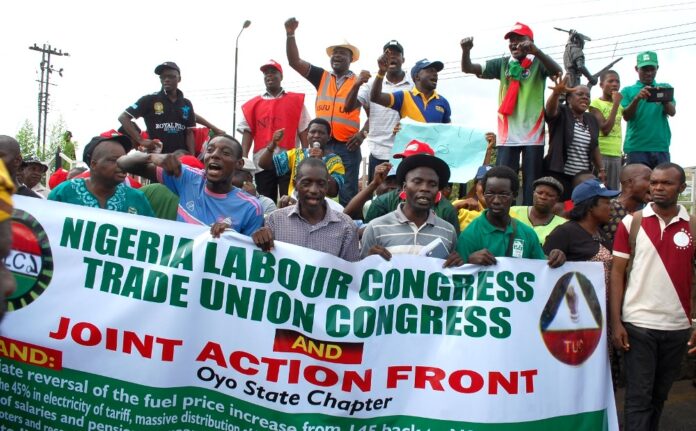By Jude-Ken Ojinnaka
The Nigerian Labour Congress and Trade Union Congress may suspend the ongoing strike which commenced on Monday June 3 to press the demand for a minimum wage for Nigerian workers.
This is coming barely 24 hours after the strike crippled the Nigeria’s economy.
Leaders of the Nigeria Labour Congress and Trade Union Congress have reached a deal with the Federal Government to suspend the ongoing indefinite strike after a meeting with the representatives led by the Secretary to the Government, Senator George Akume.
The Secretary to the Government of the Federation, Senator George Akume disclosed the deal reached on Tuesday night while unveiling the resolutions of the emergency meeting with organized labour.
The four-point resolution was signed by the Minister of Information and National Orientation, Mohammed Idris, Minister of State Labour and Employment, Nkeiruka Onyejeocha, NLC President Joe Ajaero and TUC President Festus Osifo.
According to the resolutions, the federal government said it is committed to paying a minimum wage that is higher than N60,000.
The tripartite Committee is to meet every day for the next week to arrive at an agreeable National Minimum Wage
Importantly, they added that organized labour will meet immediately to consider the federal government’s commitment.
“Labour in deference to the high esteem of the President, Commander-in-Chief of the Armed Forces, the Federal Republic of Nigeria’s commitment in iv above undertakes to convene a meeting of its organs immediately to consider this commitment; and No worker would be victimized as a result of the industrial action,” part of the resolution reads.
A senior executive of organized labour who preferred anonymity disclosed that workers would suspend the indefinite strike and return to negotiation with the government.
“For certain, organized labour will suspend its indefinite strike on Tuesday to continue negotiations with the tripartite committee.
“This is in line with the commitment extracted from the government after the meeting with the SGF”, he said.
Meanwhile, an earlier meeting between the organized labour and leadership of the National Assembly ended in a deadlock.
Consequently, workers commenced an indefinite strike on Monday, 3 June over the failure of the government to implement minimum wage and reversal of the electricity tariff hike.
Meanwhile, Nigeria’s economy was at a standstill Monday as organized Nigerian workers shut aviation, power, banks, ports, energy, road transport, and telecommunications sectors protesting the Federal Government’s failure to implement minimum wage and reversal of the electricity tariff hike.
Airlines canceled flights leaving passengers stranded at Murtala Muhammed International Airport Lagos, Nnamdi Azikiwe International Airport Abuja and other airports.
In the early hours of Monday, the Transmission Company of Nigeria announced that workers shut down the National grid leading to nationwide darkness.
Many manufacturers have been operating on diesel which is N1415.06 per litre, while small business owners run on petrol N701.24 per liter.
To make the matter worse, the Nigeria Union of Petroleum and Natural Gas Workers, (NUPENG), are not exempted from the ongoing strike, making the twin product of fuel and diesel scarce.
Also, some banks and financial institutions partly closed operations.
TheNiche gathered that banks around the Federal Secretariat in Abuja were shut down.
Ditto in Lagos, Ondo, Oyo, Kano, Delta, Bayelsa, Ebonyi, Cross River, Akwa Ibom, Benue and other states.
Activities at public offices were grounded in compliance with strike action.
Investigation revealed that National Assembly Complex was shut down by striking workers. Same with the Federal Secretariat, the Federal High Court, FCT High Court and other offices in Abuja. The same was experienced across all ports in Nigeria.
The Federal, Industrial and State High Courts in Lagos were not left out of the strike.
The strike has taken a toll in Nigeria’s economy which is already battling with high inflation, unemployment, foreign exchange fluctuations and energy crisis on the edge.
There was tension when organized labour alleged that they were surrounded by the Army at the meeting with SGF.
However, the Nigerian Army clarified that organized labour’s claim was false and misleading. The Nigeria Army said its operatives at the SGF office accompanied the National Security Adviser, Nuhu Ribadu.
Recall that the Organised labour had earlier proposed N494,000 as minimum wage, while the federal government is offering N60,000.
The organized labour had on different occasions staged a walkout from the tripartite Committee on National Minimum Wage over the government’s refusal to shift ground.
Meanwhile, the latest commitment by the Nigerian government has indicated that it is willing to pay a minimum higher than N60,000.













